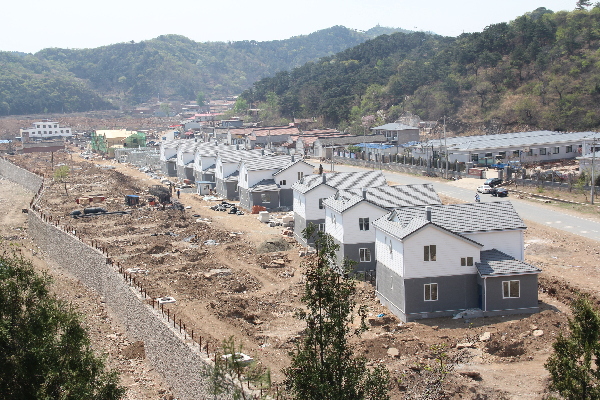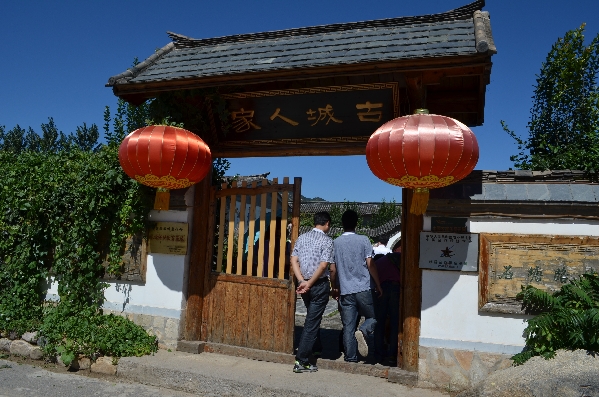

 |
|
The authorities are continuing to build homes in the new village of Taohuadi, Shicheng town, to relocate farmers from the site of Miyun Reservoir. |
 |
| Villagers visit the folk tourism cooperatives in the new village of Taohuadi, Shicheng town, which have helped farmers explore new ways to make a living. |
The local authorities say that farmers in Shicheng town - who have relocated from the area of the Miyun Reservoir and moved into new villas in the recently-built village of Taohuadi - can hope to earn a good living thanks to folk tourism cooperatives.
Sun Lijun, the Party secretary of the town, gave some details about these cooperatives during a recent interview about the local environmental protection initiatives and development of tourism.
Sun said that 45 homes have been built in Taohuadi, and that each has a construction area of 197.02 square meters. He also said that about 80 homes have been built in the nearby village of Zhangjiafen, and local farmers are eligible for discounts of more than 20 percent off the market price, and they can use the rest of their government compensation to buy necessities such as furniture.
As Shicheng is located in the mountainous area north of Beijing, there will be insufficient solar energy to provide heating in the winter, and families in the new villages will be able to use electricity for heating. Sun added that the new residents can also use their homes as small hotels.
Shicheng, which means “stone town”, received its name because of its location at the foot of the section of the Great Wall which was built in the Beiqi Dynasty. The town is situated on the west bank of the Miyun Reservoir, just over an hour’s drive from downtown Beijing.
In 2007, a total of 274 cooperatives were organized in 15 villages near the upstream of Miyun Reservoir, aiming to boost tourism and preserve and promote the local cultural heritage. Since 2008, the Beijing agricultural research center has helped these cooperatives to improve their services, and they now play a key role in the integration of resources, division of labor and unifying service standards and prices. They also assist local famers in dealing with competition.
The cooperatives have highlighted the area’s advantages to develop local tourism in three main aspects.
First, the local natural environment is the basis of the town’s development as a tourist destination. It boasts green area coverage reaching 89.5 percent, as well as 10 scenic areas, such as Taoyuan Fairy Valley, the Yunmeng Mounts - known as the "northern small Huangshan Mountains" - and Baihe River which winds through eight villages in the town.
Second, favorable policies concerning the environment help support the town’s development as a tourism destination.
Third, the local cultural heritage offers much potential. Sites include graves of war heroes - including that of Deng Yufen who lost her life in the War of Liberation and that of Bai Yihua, who was killed in the Anti-Japanese War. In addition, straw art offers other opportunities to attract visitors.
The authorities said that Shicheng’s rural economy gross income reached 600 million yuan last year, up 13.3 percent from the previous year, and the total tourism income reached 74.917 million yuan, accounting for 12.5 percent of the rural income.
Local farmers who previously went away to find jobs – thus becoming migrant workers - or helped to plant fruit trees in the mountains, are now keen on getting involved in attracting tourists. Last year, the net income per capita of farmers of Shicheng was 16860 yuan, up 10.2 percent from the previous year.
Sun quoted a local restaurant owner as saying that the net annual income of his employees now reaches over 10,000 yuan. He added that 40 percent of the tourists come from Beijing, and 30 percent from Tianjin.
In addition, the local infrastructure has been upgraded, and the traffic conditions have improved.
Sun also said that the town is striving to become a "Beautiful Shicheng", and also to develop so-called “high-end tourism.”
He focused on efforts to create an eco-friendly town, adding that the authorities aim to implement waste separation and recycling.